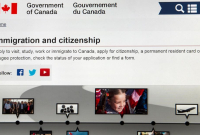Support strong Canadian climate journalism for 2025
The Trump administration has endorsed a plan to slash immigration in half, limit the entry of non-English speakers, curb family sponsorships and penalize migrants whose spouses are less skilled and it's selling that plan by pointing northward.
To Canada.
The administration is citing its northern neighbour as an inspiration for an immigration reform that contains definite traces of Canadian influence — but to find them, you'd need to squint past major aspects of the plan.
The point of commonality is a points-based system in which applicants with high skills get favoured in Canada and Australia, a program pioneered a half-century ago in the Great White North which the U.S. says it now wants to emulate.
Such a move would revolutionize an American system that has historically relied on employers and families sponsoring newcomers, in favour of just letting people apply and get a points grade based on skills and education.
"The points-based system that Canada has, has a lot to recommend it," said Stephen Miller, a presidential adviser.
"We actually took that and added things."
More precisely, they subtracted things: People.
This is where it differs from Canada's system. The reform proposed Wednesday would halve legal immigration to the United States — which already has a far smaller proportion at one million immigrants per year to Canada's 250,000.
The plan has almost no chance of becoming law in its current form.
It was swiftly opposed by some Republican lawmakers and will inevitably meet resistance from Democrats, which makes the slog to the necessary 60 per cent of Senate votes impossible without major changes.
But it has launched a debate. One immigration scholar calls this necessary for the country.
"I'm surprised that I'm not outraged," Vivek Wadhwa of Carnegie Mellon University told MSNBC. "I thought it would be another Stephen Bannon special. But it isn't. It may actually be quite reasonable. Who says that immigration can't be adapted to the needs of the country?
"Now, we can argue about the number of immigrants. ... (But) this is a good debate to be having in America."
Miller explained how the points system would work. Again mentioning Canada and Australia, he listed some examples: "Does the applicant speak English? Can they support themselves and their families, financially? Do they have a skill that will add to the U.S. economy? Are they being paid a high wage?"
The overall goal is to keep out poorer, less-educated immigrants who are likelier to claim welfare or compete for working-class jobs, Miller said. He described it as a historic change, a moral issue and something the vast majority of Americans support according to polls.
But it's sure to face a noisy fight.
The polling, for instance, showed 38 per cent support for reducing immigration, according to Gallup, compared with 38 per cent who wanted the status quo and 21 per cent who wanted more immigrants.
Even the White House news conference devolved into heated exchanges.
Miller was indignant at a suggestion that the plan might be seen as racist. Things got tense when CNN's Jim Acosta referred to his own immigrant father from Cuba and suggested this was a betrayal of the American values inscribed upon the Statue of Liberty: "Give me your tired, your poor, your huddled masses yearning to breathe free."
Miller's reply: the poem about poor immigrants, by Emma Lazarus, was added almost 20 years after the statue was erected.
He said the effect of this bill would be to cut net immigration in half. It would achieve that with a panoply of provisions. Introduced by two Republican senators from Arkansas and Georgia, the bill would:
- Reduce categories for family applications. Residents could still sponsor spouses and minor children, but not other relatives.
- Remove a diversity lottery.
- Insist upon English proficiency to immigrate.
- Redefine "immediate relative" to include children age 18 and under, down from the current age 21.
- Deduct points for skilled workers whose spouses are less skilled.
- Offer bonus points for some types of advanced degrees.
- Give bonus points for applicants earning 150 per cent of the national average income.
- Provide bonus points for some types of high achievers, not others. It mentions certain categories of Nobel prizes and certain athletes, such as those who've won an Olympic medal.
An immigration-policy analyst who worked at the U.S. embassy in Canada said this plan makes a fundamental mistake: Presenting immigrants as a burden on society, rather than an economic benefit.
Theresa Cardinal Brown said the level of U.S. immigration is what has kept the country from suffering the effects of an aging population, like Japan and Russia. And she said that while the U.S. needs immigration reform, this isn't it.
"I think some people who talk about the Canadian system don't have more than a passing familiarity. They know it's points-based and they know it's quote-unquote merit-based, but they don't know a lot about it," said the former U.S. federal official, now director of immigration and cross-border policy at Washington's Bipartisan Policy Center.
"Yes we need changes... (But this is) not workable."





Comments